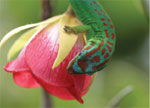
Black River Gorges National Park, Mauritius.
Native species on the island of Mauritius have long had to deal with invasive species. In fact, invasives likely played a major role in the extinction of the Mauritius’ most famous resident, the dodo. While scientists have long cataloged the impact of invasive animals on island wildlife, there has been less clarity when it comes to invasive plants. However, a new paper in mongabay.com’s open access journal Tropical Conservation Science has found that invasive plants do indeed negatively impact local species.
“The impacts of invasive alien plants appear to be considerably less severe and, at times more debatable,” the researchers explain. “In particular, it can be challenging to disentangle the impacts of alien plants on native plants from the multitude of other impacting factors like habitat fragmentation, pathogens, browsers or seed predators.”
But the researchers, from the University of Mauritius and The Mauritius Herbarium, saw an opportunity to study direct impacts when a weeding program of invasives occurred next to similar habitat that was non-weeded. By looking at the reproductive success of nine indigenous species, they found that invasive species had hurt locals.
“Flower bud, flower and fruit production were greater in the weeded area,” the scientists write. “These results are consistent with previous findings that noted greater regeneration of native trees in these areas.”
Those native species that grew in weeded areas fared much better.
“In Mauritius, several forest species regenerate better and achieve greater seedling densities following [invasive alien plant] control, which also results in a natural increase in species richness. Our findings thus suggest a possible mechanism for the greater density and species richness of native seedlings, saplings and adults trees found in weeded Mauritian lowland wet forest,” the researchers write. They note that better understanding of how invasive plants affect an ecosystem can lead to improved management, including ecosystem restoration, which badly needed in Mauritius.
Mauritius is home to an astounding 691 native plant species, nearly 40 percent of which are found no-where else in the world. Worryingly, of these, over 80 percent are considered threatened with extinction.
“Currently, only 5% of Mauritius retains remnants of native vegetation, of which less than a third comprise ‘good quality’ vegetation,” the researchers write.
CITATION: Monty, M. L. F., Florens, F.B. V. and Baider, C. 2013. Invasive alien plants elicit reduced production of flowers and fruits in various native forest species on the tropical island of Mauritius (Mascarenes, Indian Ocean). Tropical Conservation Science Vol. 6(1):35-49.
Related articles
Animal pictures of the day: booming captive breeding for Mauritius skinks
(08/14/2012) Three female orange-tailed skinks skinks have produced 16 skink babies in just four months, according to the Durrell Wildlife Conservation Trust (DWCT), which is captive breeding the Critically Endangered species. The breeding efforts are all the more remarkable since the females only produce two eggs at a time.
Invasive ant interferes with gecko’s role in pollinating endangered plant
(11/28/2008) Invasive ants are destroying the symbiotic relationship between a colorful gecko and a critically endangered flower on the island of Mauritius, reports New Scientist citing research published by Dennis Hansen and Christine Müller in the journal Biotopica.
Neon green gecko key to preventing Mauritian plant extinction

(04/17/2007) A vibrantly colored gecko plays a key role in a highly threatened ecological community in Mauritius reports new research published in American Naturalist. Studying plant-animal interactions in Mauritius, an Indian Ocean island famous for its extinct dodo bird, researchers found that a rare plant, Trochetia blackburniana, benefits from its proximity to Pandanus plants because they house high densities of geckos responsible for pollination. The findings, which unusually identify a lizard as a key pollinator, are significant because they provide “valuable management insights for ongoing conservation efforts to save the highly endangered flora of Mauritius.